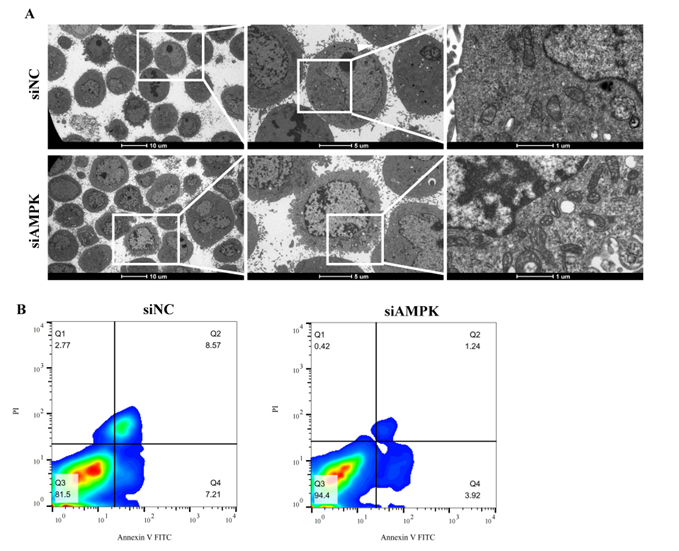Effect of AMPK Expression Regulation on Biological Behavior and Metabolic Reprogramming in Cervical Cancer Cells
##plugins.themes.bootstrap3.article.main##
Abstract
Background: Adenosine 5'-Monophosphate Activated Protein Kinase (AMPK), a pivotal regulator of energy metabolism, has been implicated in the progression of various malignancies. This study aims to reveal the crucial role of AMPK in the metabolic reprogramming of cervical cancer.
Methods: This study employed RNA interference technology to modulate AMPK expression in the SiHa cervical cancer cell line. We employed a multifaceted approach to assess the impact of AMPK on cervical cancer cell behavior, encompassing quantitative RT-PCR, CCK-8 cell proliferation assay, wound healing assay, Transwell migration and invasion assays, flow cytometry-based apoptosis analysis, Western blot protein expression analysis, and targeted metabolomics. Additionally, transmission electron microscopy was utilized to examine cellular ultrastructural alterations.
Results: AMPK activation significantly suppressed SiHa cell proliferation (p < 0.01), while paradoxically enhancing cell migration (45.3% increase, p < 0.001) and invasion (38.7% increase, p < 0.001), and reducing apoptosis rates (32.6% decrease, p < 0.01). AMPK-regulated cells exhibited enhanced proliferative and invasive capacities compared to control cells. Electron microscopic analysis revealed substantial AMPK-mediated alterations in cellular morphology and apoptosis-associated ultrastructures. Metabolomic profiling further corroborated AMPK inhibition-induced metabolic alterations, notably in linoleic acid metabolism (2.3-fold upregulation, p < 0.001) and niacin/nicotinamide metabolic pathways (1.8-fold downregulation, p < 0.01).
Conclusion: This study provides the first systematic elucidation of AMPK's critical regulatory role in the metabolic reprogramming of cervical cancer cells, revealing its multifaceted effects on cell proliferation, migration, invasion, and apoptosis. These findings not only deepen our understanding of cervical cancer progression mechanisms but also provide a crucial theoretical foundation for developing novel AMPK-targeted therapeutic strategies.

